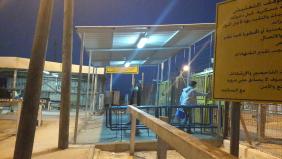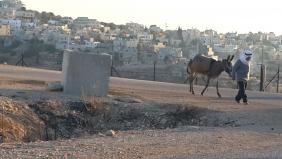'Anin, Barta'a-Reihan, Tayba-Rummana, Tura-Shaked, Thu 24.10.13, Morning
06:15 Barta’a/Reihan checkpoint
Thanks to the time difference between Israel and Palestine we could reach the Barta’a checkpoint early, while it was still dark, find a space in the parking lot, see that all the actors are in their places and able to play their parts with eyes closed. In this performance the occupier hides in a booth and only his voice is heard: Enter. Wait. Palestinians are discharged from the taxis, hurry to the yellow electronic gate and usually kick it open. From there through fenced lanes to the terminal, have their belongings scanned, their documents inspected, through another revolving gate, more fenced corridors and then out and yallah, to work. Those are the fortunate players with jobs and permits. Other actors, who aren’t visible in this performance, have a much harder, more complicated role. These are Palestinians who don’t meet the “criteria,” so they can’t get to the Palestinian villages behind the fence. At best they’re able to reach them after a very long, expensive journey, but that’s a different play.
Why do we keep coming back to this familiar, depressing show? Mainly for the sabah el-hir [good morning] with which the Palestinians graciously greet us under their breath.
07:00 A’anin checkpoint
We arrived at the same time as the soldiers, but they start working only 20 minutes later. Why? Whaddayamean why? What don’t you understand?
While we waited for the checkpoint to open H. arrived, a Palestinian aged about 30, married with children, who seemed like a gentle, good-hearted person. He lives in A’anin; his permanent agricultural permit wasn’t renewed, though it expired on 21.10.13, just when the olive harvest was underway! No, no, he’s not blacklisted. No one explained him why. His mother is the sole owner of an olive grove; he says she has a deed and everything, but the  trees are on the wrong side of the damned separation fence. So he detours around the Barta’a checkpoint, which costs him 70 shekels, or sleeps wherever he can, doesn’t see his wife and children – so he’ll be able to pick the olives. Who wouldn’t do the same?
trees are on the wrong side of the damned separation fence. So he detours around the Barta’a checkpoint, which costs him 70 shekels, or sleeps wherever he can, doesn’t see his wife and children – so he’ll be able to pick the olives. Who wouldn’t do the same?
07:20 The first to exit the checkpoint which opened at 7 are Shafik and his donkey. Shafik is getting old but the donkey he comes with is always young. He’s followed by a slow trickle of men and, for the harvest, women as well (Where are you from, they ask; we’re from Jaffa, they tell us…). Neta notices them lugging many bottles of water. The reason: to wash hands and face before prayer during the working day. The men and women are angry, justifiably: why aren’t the tractors allowed through first so that everyone travelling with them can continue immediately to the groves a few kilometers away, rather than wasting time waiting impatiently? They asked the soldiers, but the tractors cross last – so there.
A display of military vehicles at the checkpoint: some kind of prisoner van (like in the movies), a jeep, another jeep, and the DCO’s white Toyota. Too many supervisors; too little efficiency.
08:10 Crossing stops. Why? Nobody says. The soldiers gather off to the side. We telephoned the DCO; they answered courteously. They transferred us to someone in charge. Said he’d look into it. Who knows.
08:20 The tractors begin crossing. One driver says: Once the olive harvest was a festive time for us. Now it’s just nerve-wracking.
08:35 Tura/Shaked checkpoint.
No activity at all.
09:00 Tayibe/Rumaneh checkpoint
We must have come too late because it’s closed and no one’s waiting. The DCO updates us about the hours it’s open, but the soldier must have mixed up Jewish time and Palestinian time.
